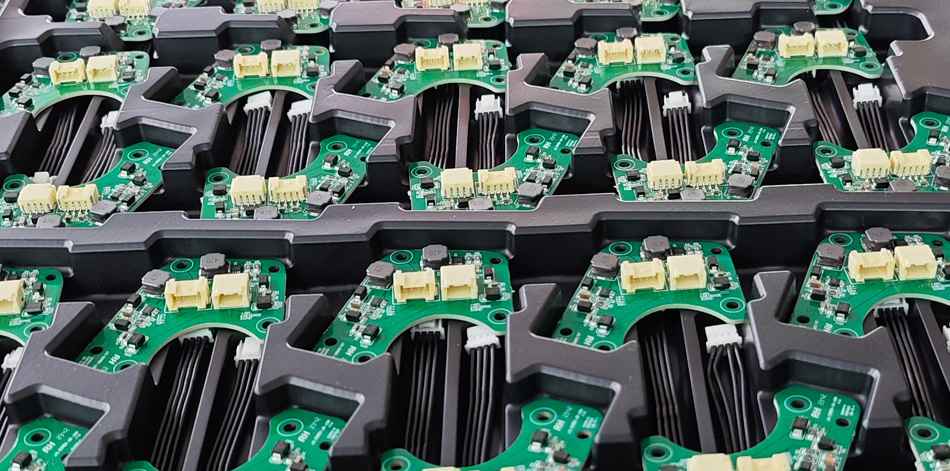- English
- Español
- Português
- русский
- Français
- 日本語
- Deutsch
- tiếng Việt
- Italiano
- Nederlands
- ภาษาไทย
- Polski
- 한국어
- Svenska
- magyar
- Malay
- বাংলা ভাষার
- Dansk
- Suomi
- हिन्दी
- Pilipino
- Türkçe
- Gaeilge
- العربية
- Indonesia
- Norsk
- تمل
- český
- ελληνικά
- український
- Javanese
- فارسی
- தமிழ்
- తెలుగు
- नेपाली
- Burmese
- български
- ລາວ
- Latine
- Қазақша
- Euskal
- Azərbaycan
- Slovenský jazyk
- Македонски
- Lietuvos
- Eesti Keel
- Română
- Slovenski
- मराठी
- Srpski језик
Why is a close supply chain relationship so important for PCBA factory delivery?
2025-07-18
In the PCBA processing industry, ensuring on-time delivery is an important consideration for customers to choose a factory. The punctuality of delivery depends not only on the efficient operation of the production process, but also on close collaboration with all parties in the supply chain. This article will explore why a close supply chain relationship is so important for PCBA factory delivery, and how to improve delivery efficiency and customer satisfaction by optimizing supply chain management.

1. Ensure a stable supply of key materials
The impact of raw materials on production continuity
The PCBA process requires a variety of raw materials, such as PCB boards, electronic components, solder, etc. If any of the key materials is in short supply, production will be affected, resulting in delivery delays. Therefore, it is crucial to maintain a close relationship with suppliers to ensure a stable supply of production materials.
The importance of supply chain partnerships
By establishing long-term partnerships with suppliers, PCBA factories can get higher priority, especially when market demand fluctuates and material supply is tight. Maintaining good cooperation with suppliers can also minimize supply chain risks and ensure that raw materials are always sufficient by negotiating reasonable delivery cycles and inventory adjustments.
2. Improve the flexibility to respond to changes in market demand
Deal with sudden order demands
In PCBA processing, customer demands change frequently, especially some customers may temporarily increase order demands. Close supply chain relationships can help factories quickly obtain raw materials and meet production requirements when demand suddenly increases. Suppliers can flexibly adjust the supply cycle in an emergency and provide the necessary support to the factory to ensure delivery.
Quickly adjust production plans
Close supply chain relationships allow PCBA factories to quickly respond to changes in market demand. For example, when market demand decreases, negotiate with suppliers to adjust the purchase volume to avoid excessive inventory; when market demand increases, accelerate material supply and quickly adjust production plans to maintain stable delivery capabilities.
3. Reduce inventory costs and optimize cash flow
Inventory management under the JIT model
Close supply chain relationships enable PCBA factories to better implement the JIT (Just-In-Time) inventory management model. The JIT model relies on suppliers' on-time delivery to reduce inventory backlogs and storage costs, thereby improving the efficiency of cash flow utilization.
Collaborative information sharing to reduce inventory risks
By sharing production plans and inventory information with suppliers, PCBA factories can coordinate the production and distribution of materials in advance to avoid problems such as over-purchasing or insufficient inventory. The timely sharing of such information can significantly reduce inventory management risks, ensuring that raw materials for production are in place when needed and without backlogs of funds.
4. Dealing with supply chain disruption risks
The impact of natural disasters and emergencies
Sudden disruptions in the supply chain (such as natural disasters, policy changes, and international logistics fluctuations) pose a considerable challenge to the delivery of PCBA processing. By maintaining close cooperation with suppliers, factories can get more support in emergencies, such as priority allocation of materials, extended supply terms, etc., to ensure the continuity of production and delivery.
Establish an emergency supply chain
A close supply chain relationship can help PCBA factories quickly activate emergency supply chains when emergencies occur. For example, select backup suppliers and quickly transfer procurement when the original supply chain is blocked to prevent production interruptions. By regularly communicating with suppliers and conducting emergency drills, factories can improve the risk resistance of the supply chain and ensure the stability of delivery.
5. Improve supply chain management efficiency and information transparency
Information sharing and collaborative optimization
Information transparency of all parties in the supply chain is the key to improving management efficiency. Close supply chain relationships allow PCBA factories and suppliers to share data such as production plans, order information, and inventory levels, thereby achieving coordinated optimization in procurement, production, and delivery. This transparency and collaborative cooperation help factories to more accurately grasp the material supply situation, adjust delivery plans in advance, and avoid delays.
Optimize processes and reduce communication costs
By establishing a close supply chain relationship, PCBA factories and suppliers can form a standardized and convenient communication mechanism, simplify the communication process, and quickly solve problems. Close cooperation can also reduce misunderstandings and errors caused by information asymmetry, improve the overall operational efficiency of the supply chain, and provide better services to customers.
Summary
In the PCBA processing industry, a close supply chain relationship is an important pillar to ensure on-time delivery. By establishing long-term cooperation with suppliers, PCBA factories can achieve a stable supply of raw materials, respond quickly to market changes, optimize inventory and cash flow management, and enhance risk resistance. A close supply chain relationship also improves information transparency and management efficiency, provides customers with more efficient delivery services, and helps factories remain competitive in the market.
-
Delivery Service






-
Payment Options









